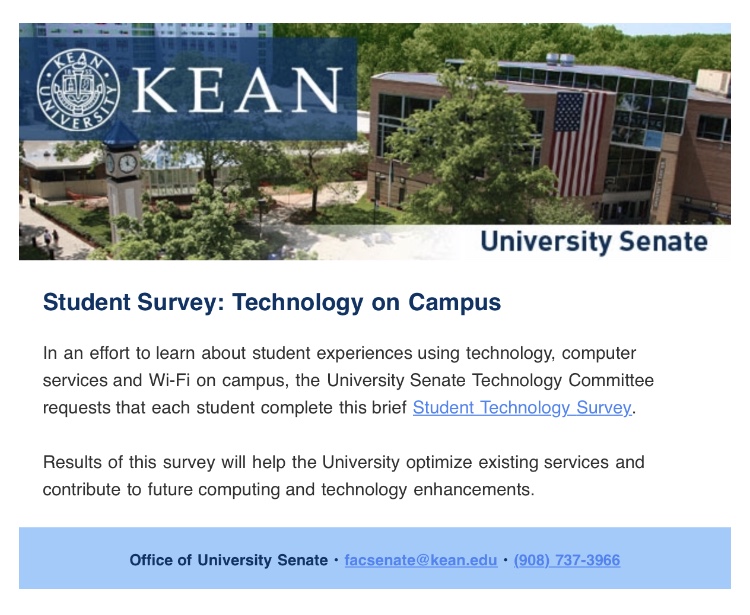By Rafaela Teixeira | Published by March 16, 2018
The long-time technology issues at Kean University have finally been addressed in the Faculty Senate meeting held on Feb. 13.
Patrick Ippolito, Head of the University Senate, briefly mentioned the awareness on the technology problems on campus and noted that a survey would be delivered via email to all students on the issue.
The email was sent from University Relations department shortly after the meeting, requesting students to take the survey attached to understand their experiences with technology, computer services and Wi-Fi connection.
It is meant to help the University Senate Technology Committee assess the issues better by determining the exact locations of technology failure, wifi disconnection and who is being affected by it.
According to the email, the University will use the results from the survey to “optimize existing services and contribute to future computing and technology enhancements.”
Some of the questions students need to answer are their opinions on whether technology improves their learning in classrooms, their satisfaction with the printers provided on campus, preferred furniture in classroom settings and if the Wi-Fi is meeting student needs.
The survey also requests students to provide suggestions on how to improve Kean’s technology.
Najiba Syed, student manager at the Office of Computer and Information Services (OCIS), explained the process of placing a work order in the system for the student technicians to service students, faculty and staff.
The frontdesk operator takes basic information down, name, issue, location, and asks the caller to try specific methods to resolve the technical difficulty. If the basic solutions don’t work, the operator puts the work order in the system to inform the student technicians that they need to pay the caller/location a visit.
According to Syed, a work order takes 1-3 business days to complete and if the student technician is unable to resolve the issue, it gets elevated to full-time employees.
Technology problems are equal among all Kean buildings, according to Syed, however the Center for Academic Success (CAS) has the most complaints.

Common issues on campus include Wi-Fi connection, student game-consoles don’t connect to the network and classroom projectors that don’t work, according to Syed.
Syed also pointed out that professors tend to “rudely” call with concerns before trying to resolve the issue on their own.
“…if they do call, try to be patient and tell us all the details,” said Syed. “We get professors who yell at us and at the end of the conversation, we don’t even understand what the issue really is because all they did was yell and hang up.”
Dr. Jan Balakian, a professor in the english studies department, was relieved when she found out that the university is taking measures to fix the technical problems on campus.
“I tell students that they should have a little protest about this because it interrupts [class],” said Balakian. “…what happens is that when the machines don’t work it throws a wrench into the class. And as a result…a lot of teaching time is lost and students perceive class to be disorganized.”
Balakian has called OCIS numerous times to fix the technical issues before classes are held in order to prevent being interrupted when teaching her lesson.
Balakian has also noticed that classroom equipment such as projectors and computers, tend to be dusty and “full of gunk.”
A laptop is a necessity for Balakian when teaching, however in order to connect all the equipment together, she had to purchase the necessary cables with her own money. Balakian believes that the university should provide faculty with the essentials to make the world-class education at Kean a true statement.
“Professors are not the problem, we don’t need to take a course because we know how to press a button,” said Balakian. “These issues were not around when I first started teaching, it’s all recent. I don’t think it’s a skill issue, the machines just need to be updated.”
Balakian noted that she is open to technical assistance and is always willing to learn when OCIS comes in to fix the issues in the classrooms.
Other professors have also noticed that aside from computer labs, things tend to get a little “dicey” in the CAS building.
“I know they’ve had people from OCIS come in to slowly replace things,” said Nikki Dreste, a lecturer in the english studies department. “I feel like it pushes more of the responsibility for things going wrong on the instructor’s end and I think we have enough to worry about.”

You must be logged in to post a comment.